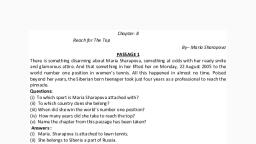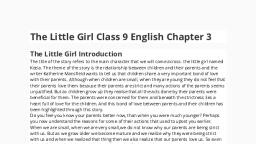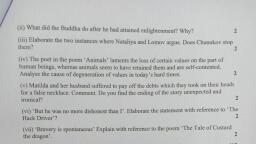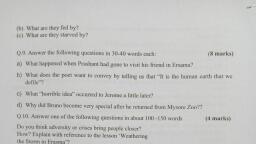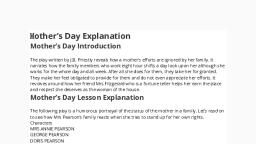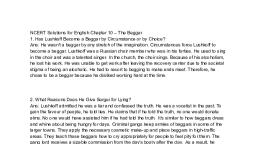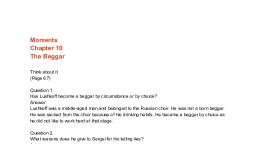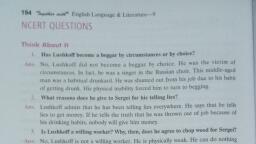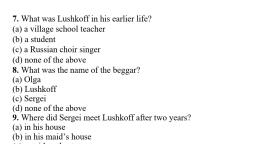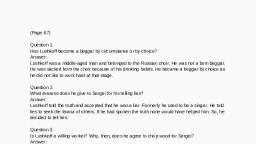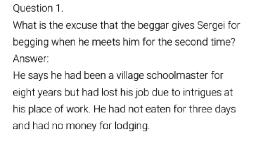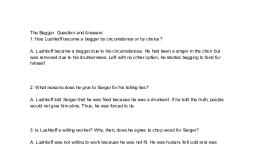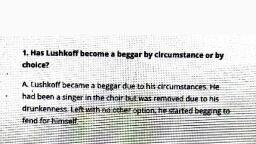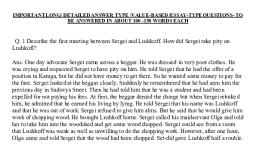Page 1 :
The Beggar :, By Anton Chekov, Introduction, The beggar is the story of the transformation of a beggar into a good person. The behaviour of a woman, made him leave alcohol and lead a good life., The Beggar Summary:, ‘The beggar’ is the story of a beggar named Lushkoff. While begging, he met an advocate, Sergei who, gave him work. Sergei asked him to cut wood at his house. He asked the cook to show him the shed, where wood was kept. The beggar was too weak and was under the influence of alcohol. He could, barely stand on his feet. Still the cook, Olga told Sergei that the wood had been chopped. Sergei was, glad that the man worked and paid him 50 copecks for chopping the wood. He asked him to come on, the first day of every month for it. Sometimes he asked him to shovel the snow or to set the wood in the, shed or to dust the rugs. He would pay between 20 to 40 copecks and once, gave his old trousers to him, too., When Sergei shifted his house, he employed the beggar to help in transporting the articles. The beggar, had changed as he was sober that day and Sergei felt satisfied that his efforts had paid in reforming a, drunkard. As he could read and write, Sergei asked his name, offered him better work and shook hands, with him. After that day, Lushkoff the beggar was never seen., After two years, Sergei was buying a ticket outside a theatre and spotted Lushkoff. Lushkoff was well, dressed and was buying a ticket of the gallery area. Sergei was glad to see him and called him. Lushkoff, was now working as a notary and earned 35 Roubles a month. He thanked Sergei for helping him out of, the pit, for his kindness. Lushkoff told Sergei that it was not for him but for his cook, Olga that he was a, changed man. She would scold him, cry for him and chopped the wood for him. Her behaviour, transformed Lushkoff. With this, he went to the theatre., The Beggar Lesson Explanation:, “KIND sir, have pity; turn your attention to a poor, hungry man! For three days I have had nothing to, eat; I haven‘t five copecks for a lodging, I swear it before God. For eight years I was a village, schoolteacher and then I lost my place through intrigues. I fell a victim to calumny. It is a year now since, I have had anything to do.”, Word meanings, Copecks: Russian coin equal to one-hundredth of a rouble, Intrigues: make secret plans to do something illicit or detrimental to someone
Page 2 :
Calumny: the making of false and defamatory statements about someone in order to damage his/her, reputation, A man was begging alms. He said that he had not eaten anything for the last three days. He did not even, have five copecks to pay for a room to spend the night at. He swore by God that he spoke the truth. He, had been a school teacher in a village for eight years but lost that job due to the conspiracy of his, colleagues. For the last one year he was without work., The advocate, Sergei, looked at the ragged, fawn-coloured overcoat of the suppliant, at his dull, drunken, eyes, at the red spot on either cheek, and it seemed to him as if he had seen this man somewhere, before., Word meaning, Suppliant: a person making a humble plea to someone in power or authority, An advocated named Sergei looked at the light brown coloured coat of the beggar. The beggar had dull,, drunken eyes. There were red spots on both his cheeks. Sergei felt that he had seen the man before., “I have now had an offer of a position in the province of Kaluga,” the mendicant went on, “but I, have’t the money to get there. Help me kindly; I am ashamed to ask, but — I am obliged to by, circumstances.“, Word meanings, Mendicant: beggar, Obliged to: compelled, forced, The beggar continued that he had got an offer of a job in the state of Kaluga in Russia. He did not have, enough money to travel to the place. He wanted help though he felt ashamed asking for it, but his, circumstances forced him to do so., Sergei’s eyes fell on the man’s overshoes, one of which was high and the other low, and he suddenly, remembered something., Sergei saw the man’s shoes – both of them had varying heel sizes. He remembered something., “Look here, it seems to me I met you the day before yesterday in Sadovya Street,” he said; “but you, told me then that you were a student who had been expelled, and not a village schoolteacher. Do you, remember?”, He said that the day before the previous day he had seen the same beggar at Sadovya street. Then the, beggar had said that he was a student who had been removed from the institution and not that he was, a school teacher. He asked the beggar if he remembered it.
Page 3 :
“N-no, that can’t be so,” mumbled the beggar, taken aback. “I am a village schoolteacher, and if you, like I can show you my papers.”, The beggar was shocked and spoke softly that that was not possible. He reasserted that he was a, schoolteacher and could show his documents as proof., “Have done with lying! You called yourself a student and even told me what you had been expelled for., Don’t you remember?”, Sergei said that he had lied enough. He added that the beggar had told him that he was a student and, had even told the reason for getting expelled from his institution., Sergei flushed and turned from the ragged creature with an expression of disgust., Word meaning, Disgust: a feeling of revulsion or strong disapproval aroused by something unpleasant or offensive, Sergei was full of anger and turned away from the beggar., “This is dishonesty, my dear sir!” he cried angrily. “This is swindling — I shall send the police for you,, damn you!”, Word meaning, Swindling: cheating a person of money, He screamed that the beggar was dishonest. He was a cheat and Sergei would hand him over to the, police., “Sir!” he said, laying his hand on his heart, “the fact is I was lying! I am neither a student nor a, schoolteacher. All that was fiction. Formerly I sang in a Russian choir and was sent away for, drunkenness. But what else can I do? I can’t get along without lying. No one will give me anything when I, tell the truth, what can I do?”, Word meaning, Fiction: falsehood, The beggar confessed that he was lying. He was neither a teacher nor a student. He had been a singer in, a Russian group and was removed due to his drinking problem. He lied because people would not give, him alms if he told them the truth., “What can you do? You ask what you can do?” cried Sergei, coming close to him. “Work! That‘s, what you can do!, You must work!“
Page 4 :
Sergei screamed at him and said that he could work instead of lying., “Work — yes. I know that myself; but where can I find work?”, The beggar said that he knew he should work but there was no work for him., “How would you like to chop wood for me?”, Sergei asked if he would chop wood for him., “I wouldn’t refuse to do that, but in these days even skilled wood-cutters find themselves sitting, without bread.”, The beggar wanted to chop wood but said that even skilled wood cutters were out of work so, who, would employ him for it., “Will you come and chop wood for me?”, Sergei offered him work., “Yes sir, I will.”, The beggar replied that he would chop wood for him., “Very well; we‘ll soon find out.”, Sergei hastened along, rubbing his hands. He called his cook out of the kitchen., Word meaning, Hastened: walked hurriedly, Sergei said that his willingness to work would be judged soon. He walked off, rubbing his hands and, called the cook from the kitchen., “Here, Olga,” he said, “take this gentleman into the wood-shed and let him chop wood.”, He asked Olga to take the man to the woodshed and let him chop wood., The scarecrow of a beggar shrugged his shoulders, as if in perplexity, and went irresolutely after the, cook. It was obvious from his gait that he had not consented to go and chop wood because he was, hungry and wanted work, but simply from pride and shame and because he had been trapped by his, own words. It was obvious, too, that his strength had been undermined by vodka and that he was, unhealthy and did not feel the slightest inclination for toil., Word meanings, Perplexity: state of being puzzled; bewilderment
Page 5 :
Irresolutely: hesitantly; undecidedly, Gait: walk, Inclination: interest, Toil: hard work, The beggar resembled a scarecrow. His reluctance to go to the shed was signified by his act of shrugging, his shoulders. He followed the cook hesitantly. He was hesitant because he was hungry and although he, wanted to work, he did not feel energetic enough to do it. As he had promised Sergei, he had to go to, work. He did not feel strong enough because he was under the influence of the alcohol and was not fit, to do laborious work., Sergei hurried into the dining-room. From its windows one could see the woodshed and everything that, went on in the yard. Standing at the window, Sergei saw the cook and the beggar come out into the yard, by the back door and make their way across the dirty snow to the shed. Olga glared wrathfully at her, companion, shoved him aside with her elbow, unlocked the shed, and angrily banged the door., Word meanings, Wrathfully: with hatred, Shoved him aside: pushed him, Sergei went to the dining room, to look outside the window. He could see the woodshed and the yard., He saw the cook and the beggar in the yard. They walked to the shed. The cook, Olga stared at the, beggar angrily, pushed him with her elbow and shut the door., Next he saw the pseudo-teacher seat himself on a log and become lost in thought with his red cheeks, resting on his fists. The woman flung down an axe at his feet, spat angrily, and, judging from the, expression of her lips, began to scold him. The beggar irresolutely pulled a billet of wood towards him,, set it up between his feet, and tapped it feebly with the axe. The billet wavered and fell down. The, beggar again pulled it to him, blew on his freezing hands, and tapped it with his axe cautiously, as if, afraid of hitting his overshoe or of cutting off his finger; the stick of wood again fell to the ground., Word meanings, Billet: here, a thick piece of wood, Feebly: weakly, The he saw the beggar, who had lied that he had been a teacher, sitting on a log of wood. He sat with his, cheeks resting on his fists. Olga threw the axe towards him and scolded him. The beggar pulled the piece, of wood towards him, placed it between his feet and hit it weakly with the axe. The wood shook and, feel. He pulled it up again, tried to warm up his hands by blowing into them and again tapped the wood, with the axe. He was careful, not to hit his shoes or cut his finger. The wood fell once again.
Page 6 :
Sergei’s anger had vanished and he now began to feel a little sorry and ashamed of himself for having, set a spoiled, drunken, perhaps sick man to work at menial labour in the cold., Word meaning, Menial labour: an unskilled, inferior job, Sergei was not angry at the beggar any longer. He felt sorry and ashamed of himself to put the poor man, at hard work in such cold weather despite the fact that he was not fit enough to do it., An hour later Olga came in and announced that the wood had all been chopped., After an hour, Olga went to Sergei and told him that all the pieces of wood had been chopped., “Good! Give him half a rouble,” said Sergei. “If he wants to he can come back and cut wood on the, first day of each month. We can always find work for him.”, Sergei was glad that the beggar had done the work. He asked Olga to pay him half a Rouble. He added, that she could tell him to come on the first day of every month to cut wood. They could give him some, work., On the first of the month the waif made his appearance and again earned half a rouble, although he, could barely stand on his legs. From that day on he often appeared in the yard and every time work was, found for him. Now he would shovel snow, now put the wood-shed in order, now beat the dust out of, rugs and mattresses. Every time he received from twenty to forty copecks, and once, even a pair of old, trousers were sent out to him., Word meanings, Waif: a homeless person, Shovel: remove snow with a shovel (a tool resembling a spade with a broad blade and typically upturned, sides), The beggar turned up on the first of the month and got half a Rouble although he was heavily drunk and, could not even stand on his feet. He went there for work often. He would do various jobs like shoveling, the snow, set the wood in the shed, beat the rugs to remove the dust and he earned 20 – 40 Copecks, for it. Once Sergei gave him a pair of trousers too., When Sergei moved into another house he hired him to help in the packing and hauling of the furniture., This time the waif was sober, gloomy, and silent. He hardly touched the furniture, and walked behind, the wagons hanging his head, not even making a pretence of appearing busy. He only shivered in the, cold and became embarrassed when the carters jeered at him for his idleness, his feebleness, and his, tattered, fancy overcoat. After the moving was over Sergei sent for him., Word meanings
Page 7 :
Hauling: transporting, Pretence: to show something which actually does not exist, Jeered at him: made fun of him, Sergei shifted to another house and hired the beggar to help in moving the articles like furniture. Now, the man was not under the influence of alcohol. He was sad and remained quiet. He hardly took part in, moving the furniture. He simply walked behind the vans with his head hanging low and did not even, pretend to be busy. He shivered due to the cold weather and seemed embarrassed when other workers, made fun of him for being idle, weak and laughed at his torn overcoat. When the work was completed,, Sergei called the beggar., “Well, I am happy that my words have taken effect,‘” he said, handing him a rouble. “Here’s for, your pains. I see you are sober and have no objection to work. What is your name?‘”, Sergei said that he was happy to see the change in the beggar due to his scoldings. He gave him a Rouble, for his labour and asked him his name as he had left drinking and was willing to work too., “Lushkoff.”, The beggar replied that his name was Lushkoff., “Well, Lushkoff, I can now offer you some other, cleaner employment. Can you write?‘”, Sergei wanted to offer him better work and asked if he could write., “I can.”, Lushkoff replied that yes he could write too., “Then take this letter to a friend of mine tomorrow and you will be given some copying to do. Work, hard, don’t drink, and remember what I have said to you. Goodbye!”, Sergei handed him a letter to be delivered to a friend of his. Sergei’s friend would give copying work to, Lushkoff. He instructed him to work hard. They parted., Pleased at having put a man on the right path, Sergei tapped Lushkoff kindly on the shoulder and even, gave him his hand at parting. Lushkoff took the letter, and from that day forth came no more to the yard, for work., Sergei was happy that he had reformed a man. He tapped Lushkoff on his shoulder and shook hands, with him. Lushkoff went away with the letter and never returned., Two years went by. Then one evening, as Sergei was standing at the ticket window of a theatre paying, for his seat, he noticed a little man beside him with a coat collar of curly fur and a worn sealskin cap., This little individual timidly asked the ticket seller for a seat in the gallery and paid for it in copper coins.
Page 8 :
Word meaning, Timidly: in a shy or nervous way, After two years, one evening Sergei was standing at the ticket window of a theatre. He was buying a, ticket. He saw Lushkoff standing next to him. He was well dressed, wore a coat, the collar was made of, fur and wore a cap made of seal‘s skin. He was shy as he asked for a ticket of the gallery seat and paid, for it in coins made of copper., “Lushkoff, is that you?” cried Sergei, recognising in the little man his former wood-chopper. “How, are you? What are you doing? How is everything with you?”, Sergei recognised Lushkoff and met him. He asked how he was, what he was doing and how everything, was going., “All right. I am a notary now and am paid thirty-five roubles a month.”, Word meaning, Notary: a person authorized to perform certain legal formalities, especially to draw up or certify, contracts, deeds, and other documents for use in other jurisdictions, Lushkoff replied that he was fine and was working as a notary. He got paid 35 Roubles a month., “Thank Heaven! That‘s fine! I am delighted for your sake. I am very, very glad, Lushkoff. You see, you, are my godson, in a sense. I gave you a push along the right path, you know. Do you remember what a, roasting I gave you, eh? I nearly had you sinking into the ground at my feet that day. Thank you, old, man, for not forgetting my words.”, Word meanings, Godson: a boy or a man whom one promises to bring up, Roasting: here, scolding, Sergei was glad and thanked God for reforming the beggar. He said that he considered Lushkoff to be his, Godson because it was due to his scolding that he was a changed man. That day, the beggar had been at, his feet, asking for mercy. He was glad that Lushkoff did not forget his words., “Thank you, too.” Said Lushkoff. “If I hadn’t come to you then I might still have been calling myself a, teacher or a student to this day. Yes, by flying to your protection I dragged myself out of a pit.“, “I am very glad, indeed.”, Lushkoff thanked him and said that if he had not met Sergei that day, he would still be lying and, begging. He came out of the pit with the help of Sergei and was glad for his help.
Page 9 :
“Thank you for your kind words and deeds. I am very grateful to you and to your cook. God bless that, good and noble woman! You spoke finely then, and I shall be indebted to you to my dying day; but,, strictly speaking, it was your cook, Olga, who saved me.”, He thanked Sergei for his kindness. He was grateful to the cook. She was a noble woman. Although, Sergei had been kind to him, it was Olga who saved him and reformed him., “How is that?”, He asked Sergei how he felt about the truth., “When I used to come to your house to chop wood she used to begin: ‘Oh, you sot, you! Oh, you, miserable creature! There’s nothing for you but ruin.‘ And then she would sit down opposite me and, grow sad, look into my face and weep. ‘Oh, you unlucky man! There is no pleasure for you in this, world and there will be none in the world to come. You drunkard! You will burn in hell. Oh, you unhappy, one!’ And so she would carry on, you know, in that strain. I can‘t tell you how much misery she, suffered, how many tears she shed for my sake. But the chief thing was — she used to chop the wood, for me. Do you know, sir, that I did not chop one single stick of wood for you? She did it all. Why this, saved me, why I changed, why I stopped drinking at the sight of her I cannot explain. I only know that,, owing to her words and noble deeds, a change took place in my heart; she set me right and I shall never, forget it. However, it is time to go now; there goes the bell.“ Lushkoff bowed and departed to the, gallery., Word meaning, Sot: a habitual drunkard, Lushkoff continued that when he would visit the place to chop wood, Olga would scold him. She would, feel sad for him and wept. She felt very sad for him and would chop all the wood for him. Her behaviour, changed him. Just then, the bell rang. Lushkoff bowed to Sergei and left for the gallery of the theatre., Question Answers:, 1. Has Lushkoff become a beggar by circumstance or by choice?, A. Lushkoff became a beggar due to his circumstances. He had been a singer in the choir, but was removed due to his drunkenness. Left with no other option, he started begging, to fend for himself., 2. What reasons does he give to Sergei for his telling lies?, A. Lushkoff told Sergei that he was fired because he was a drunkard. If he told the truth,, people would not give him alms. Thus, he was forced to lie., 3. Is Lushkoff a willing worker? Why, then, does he agree to chop wood for Sergei?, A. Lushkoff was not willing to work because he was not fit. He was hungry, felt cold and, was under the influence of alcohol. He agreed to chop wood for Sergei because of his, pride and shame. He was trapped in his own words.
Page 10 :
4. Sergei says, “I am happy that my words have taken effect.” Why does he say so? Is he right in, saying this?, A. When Sergei met Lushkoff for the first time, he was reluctant to work. Gradually, he, took to work and reformed. Sergei felt that his words and deeds had changed Lushkoff., He is right in saying so because if he had not offered him work, Lushkoff would still be, begging in the streets., 5. Lushkoff is earning thirty five roubles a month. How is he obliged to Sergei for this?, A. Lushkoff is obliged to Sergei for earning 35 roubles a month as a notary. When Sergei, noticed that Lushkoff had given upo drinking, he offered him a better job due to which, Lushkoff became a notary one day., 6. During their conversation Lushkoff reveals that Sergei‘s cook, Olga, is responsible for the, positive change in him. How has Olga saved Lushkoff?, A. Olga hated the beggar. She scolded him, felt pity for him and even chopped the wood, for him. She would cry to see his pathetic condition. All this had an affect on Lushkoff, and changed him., Extra Questions and Answers: Short Answer Type, Question 1., How did Sergei respond to the beggar‘s request for money?, Answer:, He looked closely at him and recognised him as the same person who he had seen on Sadovya, Street a few days back, when he had introduced himself as a student who had been expelled., Question 2., What was the beggar’s real identity?, Answer:, He had been part of the Russian choir, but had lost his place there due to drunkenness., Question 3., How does the beggar react to Sergei’s offer to chop wood for him in return for money?, Answer:, The beggar accepts the offer readily and follows Sergei home. He says that he can’t refuse, because in those days even skilled woodcutters found themselves sitting without food and, work., Question 4., Why has the beggar been described as a scarecrow?, Answer:, He has been described as a scarecrow because he was as thin as a scarecrow and shabbily, dressed in ill- fitting, mismatched clothes.
Page 11 :
Question 5., What was the real reason the beggar agreed to work for the writer?, Answer:, The real reason was that he was a proud man and he felt ashamed at having been trapped by his, own words in front of Sergei. He wanted to prove that he could do honest work when given the, opportunity., Question 6., How did Olga react to the beggar?, Answer:, She glanced at the beggar with anger, shoved him aside with her elbow, unlocked the shed and, angrily banged the door. She then flung down an axe at his feet, spat angrily and appeared to be, scolding him., Question 7., What did Sergei expect the beggar to do when he called him while moving to another house?, Did he behave as expected?, Answer:, When he was moving to another house, Sergei called the beggar and asked him to help with the, packing and hauling of the furniture. However, the beggar did not do anything except hang, around, sober, yet gloomy and silent., Question 8., What did Sergei offer Lushkoff? Why did he do so?, Answer:, Sergei offered Lushkoff a job with his friend, who needed someone to do some copying work., Since Lushkoff knew how to write, Sergei offered him this job., Question 9., When and where did Sergei meet Lushkoff after two years?, Answer:, Two years later, they met at the ticket window of a theatre, where Lushkoff was buying a ticket., Question 10., What surprised Sergei about Lushkoff when he met him at the theatre?, Answer:, He was surprised to see how much Lushkoff had changed. He was wearing decent clothes and, had got a job as a notary, earning thirty five roubles., Question 11., What does Sergei call Lushkoff? Why does he do so?, Answer:, He calls him his godson, because he had scolded him and pushed him away from begging on the, streets, encouraging him to take up respectable work. He had started as a copier, and was not, working as a notary., Question 12., Mention two main qualities of the cook.
Page 12 :
Answer:, She was compassionate and sensitive. Though she appeared to be tough and rude on the, outside, she was very kind hearted, and actually helped him earn the money offered by doing all, the work for him., Question 13., Discuss the title of the story. Is it appropriate?, Answer:, The Beggar is an appropriate title for the story, as it revolves around the transformation that, takes place in the life of a beggar. He was a wastrel and did not do any work. It was only due to, the compassion shown by the cook at the narrator‘s house that was he able to change his, outlook., When he was too drunk and weak to perform any of the odd jobs he was supposed to do, the, cook did all the work for him, feeling sorry for him and worrying about his sorry state. This, kindness on her part had a tremendous effect on the beggar, who changed his ways, stopped, drinking and slowly over the years got a steady job as a notary, earning thirty five roubles as, salary., Long Answer Type:, Question 1., Has Lushkoff become a beggar by circumstance or by choice? What reasons does he give Sergei, for lying?, Answer:, He has become a beggar both by circumstance and by choice. He had lost his position in the, Russian choir due to his drunkenness. As he did not have the motivation to work hard or the, skills to find another job, begging was the easiest option. According to him, he has to lie to, survive, as no one was willing to help him if he told them the truth., Question 2., Is Lushkoff a willing worker? Why does he agree to chop wood for Sergei?, Answer:, No, he is not a willing worker. He is too thin, weak and emaciated to work. He also remains, drunk most of the time and is hence too unsteady to focus on any work. However, he agrees to, chop wood for Sergei out of shame and pride, because he had been trapped by his own words., Sergei had caught him lying, and this was the only way he could redeem some of his selfrespect., Question 3., Sergei says ‘I am so happy that my words have taken effect’. Why does he say so? Is he right in, saying this?, Answer:
Page 13 :
He says this when he sees Lushkoff at the theatre and learns that he had improved his life, greatly. He was no longer a drunkard and beggar; instead, he had become a notary, earning, thirty five roubles a month. Sergei feels that he is responsible for this change in Lushkoff, and, that the beggar changed his ways because of the scolding he had given him for begging and, deceiving people., He is right to some extent, because he had hurt LushkofTs pride, and also offered him actual, work chopping wood, and other odd jobs, which allowed him to earn money honestly. However,, the real credit for LushkofTs change went to Sergei‘s cook, who had actually done all the work, that Lushkoff was supposed to do. Her selflessness, empathy and concern for his wellbeing had, made such a deep impression on Lushkoff that he had changed his ways., Question 4., During their conversation, Lushkoff reveals that Sergei‘s cook is responsible for the positive, change in him. How did Olga save Lushkoff?, Answer:, Olga, Sergei‘s cook, would react to Lushkoffs appearance at the house by shouting at him, but, soon she would grow sad looking at his face, and start weeping. She would remind him that, since he was a drunkard, he would bum in hell and this thought would make her cry again., Finally, seeing that he did not have the energy and ability to do the task he was supposed to, she, herself would chop all the wood for him. Her concern and worry for him changed Lushkoff. He, stopped drinking and worked hard to improve his life., Question 5., Both Sergei and his cook were kind to the beggar. Compare and contrast their characters and, the effect they had on Lushkoff., Answer:, Sergei was a wealthy advocate with a kind heart. He appears to be a practical man who tries to, stop Lushkoff from begging by giving him an alternative method of earning a living. He is also, resourceful as he keeps engaging Lushkoff in different tasks, which are helpful for both the, beggar and him. In the end he sends him to him friend, who needs someone to do some copying, work. This helps the man to get a stable job and make a decent living. At first, he takes the, credit for the beggar’s transformation, but later he is humble enough to accept that though he, provided the opportunity, it was his cook Olga who deserved the credit for inspiring the beggar, to change., The cook, on the other hand, is the most noble and compassionate character in the story., Initially, she appears to be angry with the arrival of the beggar, and seems to ill-treat and abuse, him. In reality, however, she is the one performs all the tasks for the beggar and lets him take, the credit and money for them. She is empathetic to the extent that she cries seeing the state, the beggar is in, and his fate if he continues to be a wastrel and drunkard., It is her selflessness and compassion that brings about a change in the beggar’s character., Because of her empathy, he is able to remain sober and starts working hard, becoming a notary
Page 14 :
earning a stable salary within two years. She is thus able to save the life of the beggar, even, though she isn’t actually aware of the profound effect she has on him, and never takes any, credit for what she has done.



